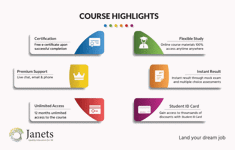Introduction to Statistics and Data Analysis
CPD Certified Diploma | FREE Exam | 24/7 Tutor Support | Lifetime Access | 100% Success Rate
Janets
Summary
- Certificate of completion - £9.99
- Certificate of completion - £15.99
- Exam(s) / assessment(s) is included in price
- Tutor is available to students
Add to basket or enquire
Overview
The Introduction to Statistics and Data Analysis course offers participants the opportunity to master Statistics Essentials, paving the way for a rewarding career in a data-driven world. As businesses and industries increasingly rely on data to inform their decision-making processes, the demand for individuals skilled in data analysis continues to grow. In the UK, statistics show that the data analytics market is expected to expand significantly in the coming years, creating numerous job opportunities for those with a strong foundation in statistics and data analysis.
Learning Outcomes:
- Gain a fundamental understanding of statistics and its applications.
- Compute measures of central tendency and dispersion for data sets.
- Analyse relationships between variables using correlation and regression.
- Develop skills in probability calculation and interpretation.
- Understand sampling techniques and their importance in data analysis.
- Construct and interpret various charts and graphs for data visualisation.
- Perform hypothesis testing to make data-driven decisions.
- Identify and avoid common statistical mistakes in data analysis.
CPD
Course media
Description
Through this comprehensive Introduction to Statistics and Data Analysis course, participants will gain a solid understanding of statistics, mastering key concepts such as central tendency, dispersion, correlation, regression, probability, sampling, and hypothesis testing. As a result, they will be equipped to tackle real-world data analysis challenges, communicate their findings effectively, and avoid common statistical mistakes.
With a curriculum designed to cater to both beginners and those seeking to refresh their statistical knowledge, this Introduction to Statistics and Data Analysis course provides participants with the skills necessary to excel in a range of careers, from data analysis and market research to quality control and statistical consulting. Enrol in the Introduction to Statistics and Data Analysis course today to seize the opportunities that await you in the thriving data analytics industry.
Here is the curriculum breakdown of this Introduction to Statistics and Data Analysis course:
Module 01: Introduction to Statistics
Gain a foundational understanding of statistics and explore its various applications in real-world scenarios.
Module 02: Measuring Central Tendency
Learn how to calculate and interpret mean, median, and mode, which are crucial for summarising data.
Module 03: Measures of Dispersion
Understand the importance of range, variance, and standard deviation in assessing data spread.
Module 04: Correlation and Regression Analysis
Examine relationships between variables and use regression techniques to make predictions.
Module 05: Probability
Investigate probability concepts and learn to apply them in a range of situations.
Module 06: Sampling
Discover the significance of sampling techniques in data analysis and their impact on the accuracy of results.
Module 07: Charts and Graphs
Develop skills in creating and interpreting various data visualizations for effective communication.
Module 08: Hypothesis Testing
Master the process of conducting statistical tests to make data-driven decisions.
Module 09: Ten Common Statistical Mistakes
Identify prevalent errors in statistical analysis and learn strategies to avoid them.
Who is this course for?
This Introduction to Statistics and Data Analysis course is designed for individuals with little to no background in statistics who wish to develop foundational skills in data analysis. It is suitable for students, professionals, and researchers from diverse fields, such as business, finance, healthcare, education, and social sciences. The Introduction to Statistics and Data Analysis course aims to equip participants with essential statistical knowledge and tools to make data-driven decisions and effectively communicate their findings.
Career path
- Data Analyst - £25-50k/year
- Market Research Analyst - £23-45k/year
- Quantitative Analyst - £30-70k/year
- Biostatistician - £35-60k/year
- Quality Control Analyst - £24-45k/year
- Statistical Consultant - £30-80k/year
Questions and answers
Currently there are no Q&As for this course. Be the first to ask a question.
Certificates
Certificate of completion
Digital certificate - £9.99
Receive a digital copy of your certificate as a PDF file for only £9.99.
Certificate of completion
Hard copy certificate - £15.99
A physical, high-quality copy of your certificate will be printed and mailed to you for only £15.99.
For students within the United Kingdom, there will be no additional charge for postage and packaging. For students outside the United Kingdom, there will be an additional £10 fee for international shipping.
Reviews
Currently there are no reviews for this course. Be the first to leave a review.
Legal information
This course is advertised on reed.co.uk by the Course Provider, whose terms and conditions apply. Purchases are made directly from the Course Provider, and as such, content and materials are supplied by the Course Provider directly. Reed is acting as agent and not reseller in relation to this course. Reed's only responsibility is to facilitate your payment for the course. It is your responsibility to review and agree to the Course Provider's terms and conditions and satisfy yourself as to the suitability of the course you intend to purchase. Reed will not have any responsibility for the content of the course and/or associated materials.




